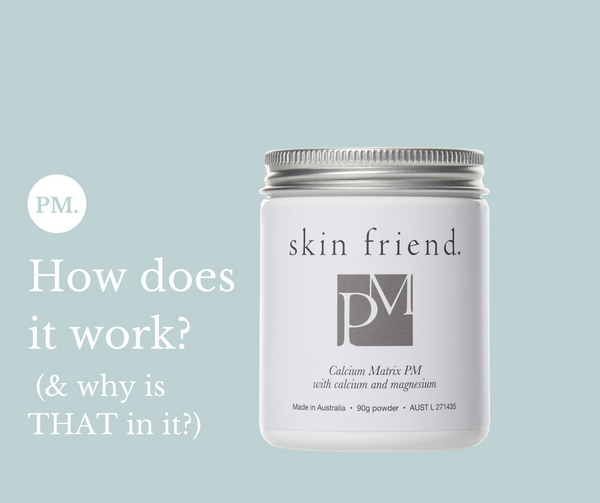
When my daughter Ayva first developed eczema we relied on topical steroids and thick ointments to control her eczema. Time and time again her red angry itchy skin returned. Then a nurse at the Early Childhood Centre suggested Ayva might be sensitive to salicylates. That was a light bulb moment for me. I thought ‘I know how to fix that’. Many years ago when I was studying to become a nutritionist I searched for a solution to my salicylate intolerance and I found it when I studied nutritional biochemistry in my final year.
For my daughter to become eczema-free we did several key things:
- We put her on a low salicylate diet (The Eczema Diet)
- We took dairy out of her diet
- We gave her Skin Friend AM for nutritional support and to prevent salicylate intolerance.

(Photo: Ayva before and after. Ayva with her grandma when she was a bub with eczema)
As a nutritionist I still felt something was missing. Being on a dairy-free diet, Ayva needed extra calcium. I could not add calcium to the Skin Friend AM formula as calcium can block the absorption of other nutrients, including zinc, so calcium should be taken at a separate time of the day (hence the ‘PM’ in Skin Friend PM). So I gave my daughter store-bought calcium, which came with flavourings and additives. It was not an ideal solution.
The problem with regular calcium supplements
For the past decade I have worked with thousands of people with skin problems, and many of them had to avoid dairy due to their skin issues. Often I recommended they buy prescription calcium. But then I found out many of them adversely reacted to these calcium supplements. When I contact the manufacturer they admitted there were some excipients that could have caused the adverse reactions.
My son is sensitive to soy and dairy so I wanted a calcium supplement for him. Several years ago he adversely reacted to a children’s calcium supplement so I called the company to see if the product contained soy. I was told that due to “IP rights” the naturopath could not tell me what else was in the product. However, she did tell me that the product contained sugar, even though the label stated “no added sugar”.
It seems companies can make the “no added sugar” claim if they did not ‘add’ the sugar... for example, if the vitamin D or calcium came with sugar already mixed with it, you don't have to add it to the label. Hmm...
That’s when I developed Skin Friend PM.

(Photo: The family. How time flies... Ayva is now 17. Photo by Lyn McCreanor)
Now I can safely assure my patients that PM does not contain hidden additives, soy, gluten, rice, seafood, sweeteners, flavorings, colors, dairy, salicylates, sulfites and other preservatives. In fact there are no food ingredients in this product so people with food allergies can safely consume it. PM is a pure powder so it has no capsule or tabletting agents that might cause itchy skin to worsen. It’s just pure nutrients.
Read about each nutrient that I've chosen for PM, below, and find out how each nutrient works in the body to aid in skin health, improved sleep, acid-alkaline balance and more.
Index (with quick links to search nutrients)
Calcium
While calcium is best known for its bone and teeth protective qualities, a high level of calcium is also found in healthy, rash-free skin (1, 2).
3 reasons why calcium is so important for your skin:
- Calcium boosts your skin’s acid mantle
You might know that lemons are acidic when you eat them but become highly alkalising after digestion. Calcium does a similar trick… Calcium is a highly alkalising mineral but when it’s consumed in extra amounts in your diet it boosts the acidity of your skin’s acid mantle. In fact, the more calcium you consume, the better your acid mantle becomes. This is important for several reasons:
a. Your acid mantle kills microbes. Dust mite allergy is common in eczema sufferers so you want to protect your skin as much as possible. This is the job of your skin's acid mantle.
Think of your acid mantle as being like an 'electric fence' that guards your skin against intruders, including dust mites and other microbes that might harm your skin. However, your acid mantle can be damaged by soaps and detergents and a poor diet deficient in skin-building nutrients.
b. People with eczema have really crap acid mantles. Researchers have found that people with atopic dermatitis (eczema) often have disrupted acid mantles that are not acidic enough.(3)
How can calcium help?
Researchers tested the skin of men before and after consuming calcium supplements and found the surface pH of their skin (their acid mantle) became more acidic after calcium supplementation.(4)
- Calcium can increase skin hydration
Calcium might not be known as a skin hydrator but it does indirectly lead to more oils being product in your skin. But only if your skin needs more oil... for example in dry low humidity that could damage the skin. Researchers found that calcium helps to maintain the right amount of moisturizing lipids in the epidermis layer of the skin by triggering lipid production when there is not enough moisture in the air.(5)
- Calcium carbonate helps your body expel chemicals
Calcium carbonate helps to restore acid-alkaline balance in the body and it quickly alkalises the urine to have a specific effect against salicylate sensitivity. If you have read my book (or blogs) you would already know that salicylate sensitivity is a commonly eczema trigger.(6) Research shows the body eliminates excess salicylates when the urine pH reaches 7.5. (7) This is a critical piece of information.
I prescribe a highly refined calcium carbonate, which contains bicarbonate, to help people with eczema (or TSW, dermatitis or psoriasis) to reach this pH to temporarily reduce their chemical intolerances and prevent the itch.
This is my secret: it’s the bicarbonate part of the calcium that does much of the work... calcium is the co-worker and together they work better than each one could individually.
What about other types of calcium for treating eczema?
When I teamed up with one of Australia’s largest and most trusted supplement manufacturers I had the opportunity to choose any type of calcium for the PM product. So we tested several types of calcium before we found the right one for our specific goal (which is to help people with eczema and other types of skin inflammation).
Calcium citrate
I tested calcium citrate first – I was taught in nutrition school that this is the best so naturally I only had eyes for calcium citrate. I know many health practitioners love calcium citrate and will dismiss everything else, but when I tested calcium citrate on a bunch of people with eczema, it made my eczema program LESS effective. This was embarrassing.
Then I found out calcium citrate contains 79% citric acid. So if you need to take 600mg of calcium, you would have to consume 2,857mg of calcium citrate to get 600mg of elemental calcium. That’s a lot of tablets! Plus you’d be consuming 2,257mg of citric acid which is too much as you only need a little to aid digestion and absorption.(8)
Due to the high levels of citric acid, which is an acidic ingredient, calcium citrate does not have the alkalizing effect needed to help people with eczema. Eczema is often an acidic condition in the body (caused by elevated arachidonic acid, which converts to inflammation-making substances) so I specifically design my programs to help restore acid-alkaline balance. This helps to reduce the itch of eczema. So I stopped using calcium citrate and looked at other options…
Plant calcium
Then I tried a plant calcium called Aquamin. Plant calcium contains a high level of natural calcium carbonate and some magnesium carbonate and a bunch of other lovely minerals so it sounded great in the brochure.
I tried plant calcium myself at home, as I always do. But I adversely reacted to it and then through research I found it had high-ish levels of lead and other heavy metals (FDA factsheet). Plant calcium is derived from seaweed grown on ocean beds, which can accumulate heavy metals, so I did not test this type of calcium again.
Bone calcium (definitely not vegan)
I did not test dolomite, bonemeal or hydroxyapatite calcium as they are derived from bones and contain high-ish levels of lead and other heavy metals. Plus I don't consume animal bones, neither do vegetarians and vegans, so I did not want these forms of calcium in my formula.
Refined calcium carbonate
Then I tested calcium carbonate as our manufacturer could supply a highly refined form with excellent purity. We really could have chosen any type of calcium but I found this calcium carbonate was finer than anything else I had tried and it really helped my patients. I liked how smooth it was, it was not gritty like regular calcium powder.
So when people ask me why I chose this calcium for my supplement, I tell them it’s not just the calcium that helps – it’s the bicarbonate that accompanies it that does part of the work to reduce itchy skin. It does this by helping the body to quickly eliminate salicylates, which are chemicals that can trigger the itch. It’s the combination of refined and pure calcium and bicarbonate that is so special.
After that long search we then teamed the calcium powder with several other lovely nutrients...
Magnesium
I’m sure you’ve already heard how magnesium is great for relaxing muscles. But I love magnesium for its ability to help decrease food chemical intolerances. As I always say, no nutrient works alone so magnesium is teamed with calcium, taurine and vitamin B6 as they all help to prevent chemical sensitivities (the latter are in Skin Friend AM).
Magnesium deficiency
The ability for your body to absorb magnesium naturally declines as you age and magnesium deficiency is common. It can be caused by diarrhoea, poor diet, low protein diets (less than 30 g/1 oz per day), fat malabsorption, frequent alcohol consumption, or frequent use of antibiotics, so supplementation can be helpful. Magnesium is added to both the AM and PM formulas to maximize absorption throughout the day.
Which type of magnesium?
Skin Friend PM contains magnesium glycinate which contains glycine and a small amount of citric acid, which enhances the absorption of both magnesium and calcium.
Glycine
Glycine is an amino acid found in protein and it’s beneficial for eczema sufferers for many reasons: it’s anti-inflammatory, cell protective and vital for collagen synthesis in the skin. Collagen is the ‘glue’ that binds the skin together, making it strong and attractive, and approximately one-third of collagen is composed of glycine.
Glycine and leaky gut
Glycine can also help to heal leaky gut according to this research (and this) as glycine is crucial for repairing the intestinal wall and mucosa. If you have leaky gut you should also avoid foods you are allergic or sensitive to as these can affect your gut lining.
Glycine for eczema and psoriasis
Glycine is classed as a ‘non-essential’ amino acid, as the body is supposed to be able to manufacture its own supply if your diet is rich in collagen. However, in eczema sufferers the ability to manufacturer glycine may not be adequate. According to researchers from the University of Heidelberg in Germany, people with eczema and psoriasis have a striking reduction in glycine receptors in the skin.
No nutrient works alone so we teamed glycine with silica to enhance collagen production in the skin.
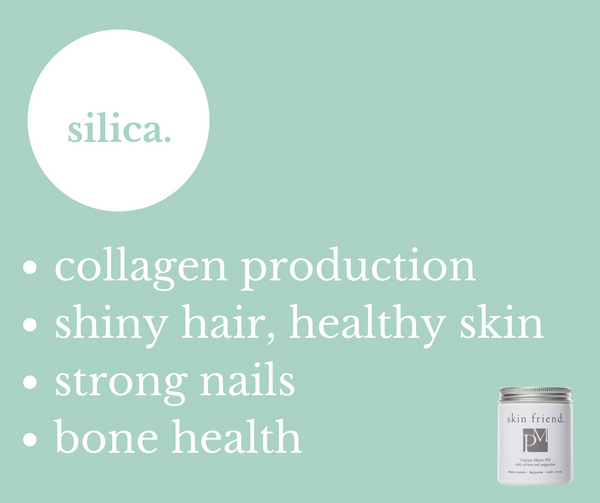
Silica
Silica is best known as a ‘skin hair nails’ nutrient and with good reason.
Silica and collagen production
Silica (silicon) is a mineral that adds firmness to various tissues in your body such as the tendons, skin and eye tissues, and it plays an important role in the formation of collagen.
A deficiency in silica was found to decrease both collagen synthesis and the development of glycosaminoglycans in the bone and cartilage. Glycosaminoglycans (affectionately known as GAGs), play a vital role in maintaining and supporting collagen and aiding the formation of elastin to improve the strength and elasticity of your skin.(9)
Shiny hair and strong nails
Silica plays a vital role in the condition of healthy, shiny hair and strong nails. It is suggested that strands of hair with a higher silicon content have lower rates of falling out and greater levels of natural shine. Nails are strengthened by the presence of silica and it is one of the predominant mineral found in nails.(10)
In a research study, hair brittleness was significantly lower after 20 weeks in a group of subjects consuming supplemental silica.(11)
Silica and bone health
Silica has an important role in bone health and bone formation. In subjects with osteoporosis, silica supplementation increased bone formation and volume, which is thought to be due to the enhanced synthesis of collagen.(12)
Recipe
So you can see why I love this range of nutrients. If you would like more information on Skin Friend PM you can find it on the links below. Here is one of my favourite recipes that I enjoy daily to keep my skin clear. It's the new updated version...
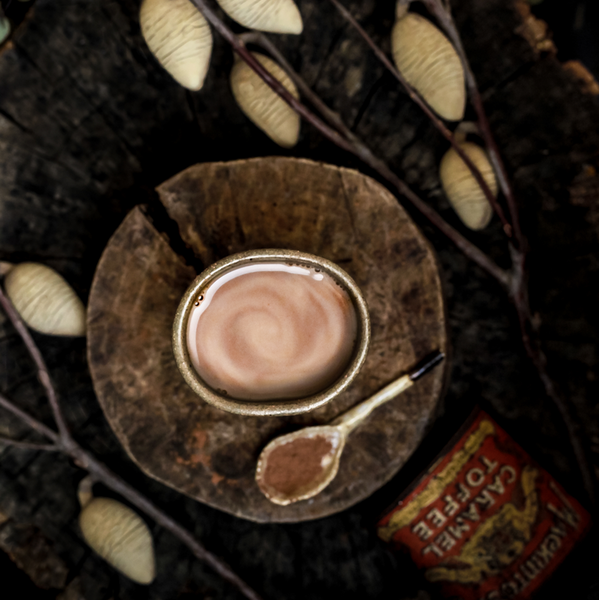
Calcium-rich Carob Tea Recipe
Carob is a great chocolate-free substitute that is good for the skin. It’s a rich source of calcium (plus I add more to meet my daily needs) and it’s salicylate free and caffeine-free. I have two cups a day, the last one just before I go to sleep as it helps me to sleep through the night. I'm such a light sleeper so having this routine (and sticking to it) has helped me a lot.
Ingredients
- 2 teaspoons carob powder
- boiling water (1/4 cup or more)
- 1 or 2 scoops Skin Friend PM
- optional sweetener: rice malt syrup or real maple syrup (these are the low salicylate options for people with eczema, TSW, rosacea and psoriasis)
- rice milk (or milk of choice, depending on your allergies)
Method
- Place the carob into a coffee mug.
- Pour on the boiling water and mix until lump-free (this is the secret to a smooth cuppa). I often like to heat the milk and make it latte style so I use less water (approx. 1/4 cup of water and 3/4 cup of milk), but it's not essential for you to heat the milk.
- Add a scoop of Skin Friend PM. Sweeten if desired and add the rice milk (heated or unheated), and mix well. Enjoy!
Have you tried Skin Friend PM? Let us know your thoughts in the comment section below.

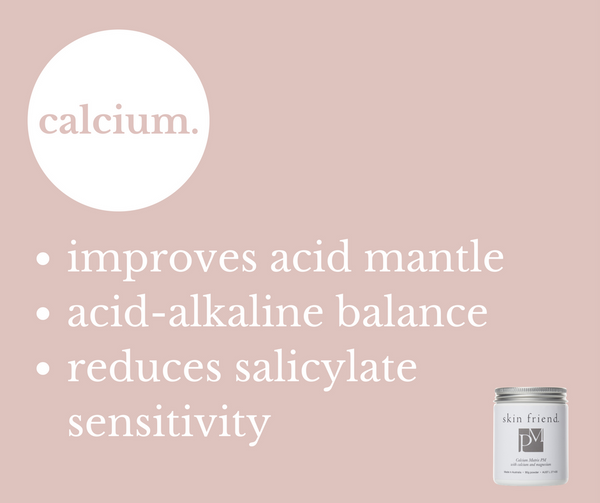
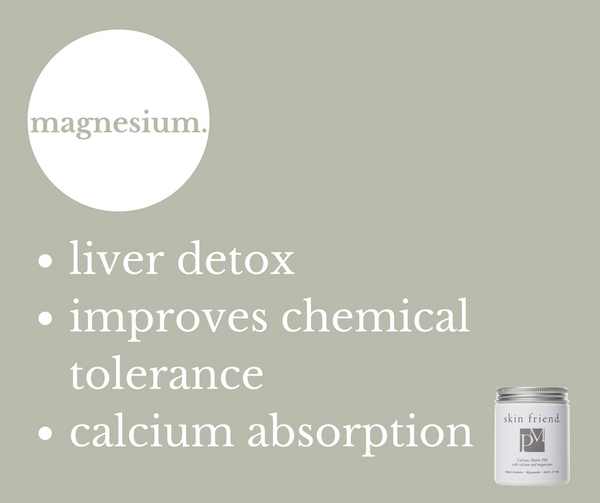
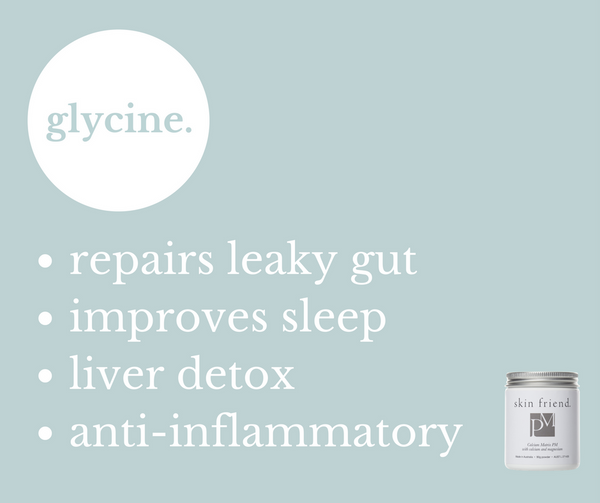







 Nothing will be posted on your behalf.
Nothing will be posted on your behalf.


Hi I am a person who suffers from food allergies with anything containing salicylates in them. Which leaves me with not much to eat in fruits or vegetables!! Is it to my understanding that this product will help allergies like mine be able to eat the foods that I couldn’t eat that had salicylates in them? Which also then would stop my hives occurring and be hives free as well as itchy free!??? How much would the Shipping costs be for someone to order this in the USA? I look forward to your reply ASAP!! Thank you !!
Cathy Muehl
Do we need to consume both skin friend AM and PM to cure Eczema or other skin rashes. How long we need to take for a completed cure.